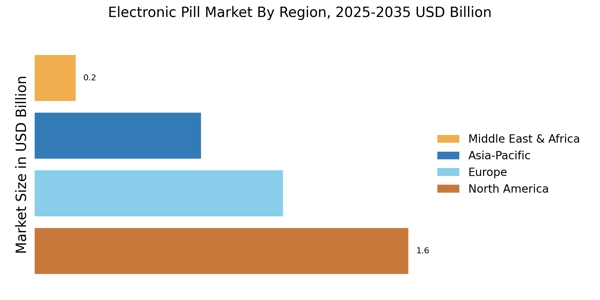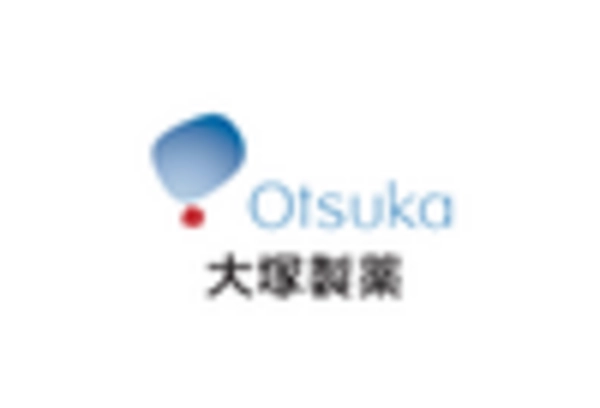Growing Awareness of Medication Adherence
The Electronic Pill Market is experiencing growth due to the increasing awareness of medication adherence among patients and healthcare providers. Non-adherence to prescribed medication regimens is a significant issue that can lead to poor health outcomes and increased healthcare costs. Electronic pills that provide reminders and track adherence are becoming vital tools in addressing this challenge. Studies indicate that improving medication adherence can reduce hospital readmissions and overall healthcare expenditures. As awareness of these issues continues to rise, the demand for electronic pills is likely to increase, positioning the Electronic Pill Market as a critical player in enhancing patient health and reducing healthcare burdens.
Technological Innovations in Drug Delivery
The Electronic Pill Market is experiencing a surge in technological innovations that enhance drug delivery systems. These advancements include the development of smart pills equipped with sensors that monitor patient adherence and provide real-time data to healthcare providers. According to recent estimates, the market for smart pill technology is projected to grow at a compound annual growth rate of over 20% in the coming years. This growth is driven by the increasing demand for personalized medicine and the need for more effective treatment regimens. As technology continues to evolve, the Electronic Pill Market is likely to see further integration of artificial intelligence and machine learning, which could optimize drug delivery and improve patient outcomes.
Rising Demand for Remote Patient Monitoring
The Electronic Pill Market is witnessing a rising demand for remote patient monitoring solutions. As healthcare systems increasingly prioritize patient-centered care, the need for tools that facilitate remote monitoring becomes more pronounced. Electronic pills that can transmit data regarding medication intake and physiological responses are becoming essential in managing chronic diseases. The market for remote patient monitoring is expected to reach several billion dollars by the end of the decade, indicating a robust growth trajectory. This trend is likely to drive the adoption of electronic pills, as they offer a seamless way to collect and analyze patient data, thereby enhancing treatment efficacy and patient engagement in their own health management.
Increased Investment in Healthcare Technology
The Electronic Pill Market is benefiting from increased investment in healthcare technology. Venture capital and private equity firms are increasingly funding startups focused on digital health solutions, including electronic pills. This influx of capital is fostering innovation and accelerating the development of new products that can improve patient outcomes. Recent reports suggest that investment in digital health has reached unprecedented levels, with billions of dollars allocated to various sectors, including medication adherence technologies. This financial backing is likely to propel the Electronic Pill Market forward, as companies leverage these resources to enhance their research and development efforts, ultimately leading to more effective and user-friendly electronic pill solutions.
Regulatory Support for Innovative Healthcare Solutions
The Electronic Pill Market is supported by regulatory bodies that are increasingly recognizing the potential of innovative healthcare solutions. Regulatory agencies are developing frameworks that facilitate the approval and integration of electronic pills into standard medical practice. This supportive environment is crucial for fostering innovation and ensuring that new technologies can be brought to market efficiently. Recent initiatives aimed at streamlining the approval process for digital health technologies suggest a commitment to enhancing patient care through innovation. As regulatory support continues to evolve, the Electronic Pill Market is likely to benefit from accelerated product development and wider acceptance among healthcare providers.

















